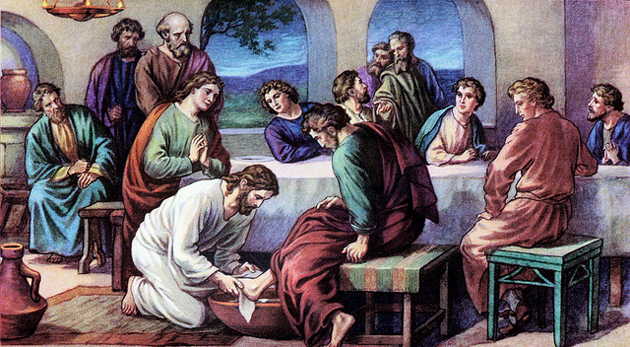The word love is a very flexible word in English. Love can mean just about anything from loyalty to a sports team, to eating a hamburger, to becoming one in covenant marriage. Love is constantly used, but its meaning is diluted. What does it mean to love someone?
 Jesus washes the feet of his disciples. Artist: Otto Adolph Stemler (Flickr, CC)
Jesus washes the feet of his disciples. Artist: Otto Adolph Stemler (Flickr, CC)
The word love is a very flexible word in English. Love can mean just about anything from loyalty to a sports team, to eating a hamburger, to becoming one in covenant marriage. Love is constantly used, but its meaning is diluted. What does it mean to love someone?
1) SERVING
The next principle of love is service. In John 13:1-17, Jesus washes his disciples’ feet. In explaining his actions, he says, “Now that I, your Lord and Teacher, have washed your feet, you also should wash one another's feet.” He explains at another time, “For even the Son of Man did not come to be served, but to serve, and to give his life a ransom for many” (Mark 10:45). Jesus both describes himself as a servant and his ministry as that of service.
We all know someone who goes out of their way to take care of the needs of others. Such service is a large part of how we love one another. William Wordsworth wrote of this: “The best portion of a good man's life, his little, nameless unremembered acts of kindness and of love.”[1] Serving is putting feet to affection and affirmation through acts of love. If you love someone – you do something to care for and help them.
Yet Christian ethics are at their root not just action we take, but the motivation behind our actions. Why we do what we do is important. God is concerned with our heart.
Vs. 4 “Love does not envy”
 Photo: Johan Hansson (Flickr, CC).
Photo: Johan Hansson (Flickr, CC).Love is generous. Love does not envy. Envy is a burning desire for what someone else has. Envy requires comparison. We all tend to compare ourselves to others, don’t we? There is an invisible ladder that exists when we meet someone. We often place ourselves and others on this ladder of social status. Those who are more attractive, successful, popular, or wealthy go higher on the ladder. Envy is when we strongly desire or lust after what someone else has at a higher rung. And you know what? No matter what the category, there is virtually always someone higher on the ladder in any particular area than any one of us.
We even do this in the Christian world, don’t we? We ask ourselves, “Am I more or less mature than this individual?” “Should I minister to this person, or should he / she minister to me?” We all are tempted to be envious of someone else.
We see a picture of this in the Old Testament. When the nation of Israel escaped from Egypt, Miriam and Aaron were not content with second place as God’s leaders, but led a rebellion to replace Moses. They were envious and wanted to be center stage in God’s work.
In contrast, love is generous, seeking to give, not to hunger for something else. Love is the only motivation that can be trusted to make comparisons. The temptations of the world – status, achievement, success – have no hold on a man or woman who loves. One who loves is seeking to give, to be generous in caring for others, not accumulating or measuring.
Vs. 6 "Love does not delight in evil but rejoices with the truth"
Love is sincere and has a positive vision. Love does not focus on the evil part of life, become embittered, or take advantage of others’ faults. Instead love is fascinated by and rejoices in truth. There is a sense of guilelessness about someone who lives based on truth.
 Photo: Garry Rollins (Flickr, CC)
Photo: Garry Rollins (Flickr, CC)The ghosts in Disney World’s haunted house are a picture of inauthenticity. They are three-dimensional figures, but are holograms. You can put your hand right through them. That is how it can feel to relate to some individuals. They are a projection of a real person but somehow lack substance. Someone who is focused on understanding and living the truth has a solidity to them.
In fact, I would argue that this integrity and guilelessness is the source of personal influence. When we know someone is genuine and authentic, we trust them. Their behavior is not directed to manipulate others but is the direct consequence of their convictions and integrity. Authenticity is a consequence of integrity.
Paul is writing here about a way of life that does not allow the evil of the world to divert it or subvert it. It dismisses evil as evil and rejoices in the truth. There is a vertical orientation to someone who is loving others based on truth. They understand the pain and evil of this world – they don’t ignore it or downplay it. But they understand that God’s plan of redemption is at work, and they rejoice in the truth.
Paul addresses this root idea in I Cor. 13:4 with his comment, “Love does not boast. It is not proud. Love is not rude and self-seeking.” In this fallen world, we all feel a sense of brokenness at some level. In response to this awareness (sometimes even unconsciously) we all tend to move towards self-conscious insecurity or toward pride.
With pride we take some activity, possession or skill and boast about it. Boasting is an insecure response of someone who is attempting to prove himself. Paul speaks of pride in another passage: “Knowledge puffs up, but love edifies” (1 Cor. 8:1). Boasting is when individuals seek to use knowledge, or some other achievement, to feel better about themselves or puff themselves up.
 Photo: Heather Kennedy (Flickr, CC)
Photo: Heather Kennedy (Flickr, CC)Someone with a weak ego is like a weak battery. They constantly need to brag about their successes in order to feel recharged. True love, in contrast, is humble, not needing to crow about some success. Humility does not mean beating ourselves up, but simply being honest. Love is strong enough to be silent, serving, and caring for others without the spotlight of attention.
Vs. 5 "Love is not rude and self-seeking"
Rudeness implies the idea of anything that is disgraceful, dishonorable or indecent. Love is none of these – love is honorable and does what is right in every circumstance. There is a fitness to love’s intentions and behavior.
Love is honorable because it is seeking to give to others, not to get or receive. The curious thing is that giving to others in selfless love is also the means to fully living and enjoying life. Sadly, many people believe that happiness comes as a result of a pursuit of happiness – rather, it comes from pursuing others’ happiness.
I knew a bricklayer and his wife for many years who exemplify this honorable love. They were two of the most godly people I have known. They knew the Word of God. They were wise, and they loved people. They were strong people. I would trust them in any circumstance to do the right thing. They were honorable people who were prudent in all their actions and sought to help anyone that they met. I admired them so much more than other individuals I knew who had received their PhDs from Harvard or were multi-millionaires. There was a substance to them. This is what honorable means, to be able and willing to do the right thing.
This is what love does. It sees the entire situation facing it and seeks to serve others and best meet the needs it perceives. This is why leaders in the Bible are often called servants. The title that Paul chose for himself was “a bond servant of Christ Jesus” (Rom. 1:1). A servant is not seeking his own agenda but his master’s.
Have you ever met someone who has to talk constantly? This person feels so needy that they seek to be center of everyone’s attention. That is a picture of what Paul is attempting to explain here. He is saying love isn’t the self-seeking, rude behavior which needs attention. Rather love in this circumstance would be the ability to listen, which shows that we love.
In I Peter 5:5, Peter writes of how a leader must be clothed with humility. The verb here refers to how a slave ties on a white apron in order to serve. To effectively love and serve others, we need to stop being concerned with who gets credit. We need to love freely and unashamedly.
2) FORGIVING
The next element of the Lord's love is forgiveness. Peter failed the Lord in a way we never will — he rejected him three times. But this failure created an amazing opportunity for grace. The image we have of Peter's forgiveness is beautiful. John’s gospel records that soon before the Lord ascended into the sky, he went back to Galilee. When Peter was out fishing with the other apostles, he saw the Lord on the shore. Peter threw himself into the water in his joy to be with the Lord. Why was he so eager when he had failed the Lord miserably? Because Peter was confident of the Lord's love. He had already experienced the Lord's grace and forgiveness.
With committed relationships we each have countless opportunities to ask for and grant forgiveness. When I think of how people interact with each other, I can't get away from the picture of us as walking bananas - we bruise easily. It is very easy to be hurt and just take it inside and rot.
Forgiveness is not ignoring or refusing to acknowledge wrongs or pains, but letting it go. During the second World War, Hitler ordered that all the churches in Germany be consolidated into one church. The Brethren Church split over this issue, and as a result, those who refused to participate were persecuted. Members of their families were killed in concentration camps. After the war, as you might expect, there continued to be great bitterness and hurt on both sides of the Brethren Church. Finally, the elders from both churches came together. They all went away to pray. When they were finished, they all came back and met together. When asked, "What happened then?" an elder replied, "We were just one."[2] There was true forgiveness.
We cannot control how other people will respond to difficulties in a relationship. It is possible that a relationship might not be restored if the other person doesn't want it. In Rom. 12:18, Paul writes that “we need to be at peace with all men – as far as we are able.” The point is that sometimes the other person isn’t willing. This is painful, but it doesn’t take away our responsibility. We still need to forgive and love them. Forgiveness is needed in any relationship, for we all fail. Our memories need to have a moral filter - remembering what to keep and what to forget about. To truly love we need to forgive.
I Corinthians 13:5-6 addresses this point: “Love is not easily angered. It keeps no records of wrongs. Love does not delight in evil but rejoices with the truth.” These are three principles of how love responds to some evil or sin in the world.
- Love keeps its wholesomeness and good temper in response to evil.
- Love has a short memory of the hurt it suffers.
- In the presence of wrong and evil, love focuses on and lives the truth.
Paul teaches that Love is not easily angered. This is the first failure of many Christians – including myself. We excuse our anger and say “that’s just the way I am”, or that “everyone in our family has a bad temper.” But Paul confronts all these rationalizations and says, in effect, “No, it is not loving to be easily angered.” Love isn’t just positive motivations, but it can also mean resisting our negative emotions. Love is self-control in the face of irritating circumstances.
Now there are times to be angry. There are even times when love demands that we be angry. Jesus was angry in the temple when the money changers sought to misuse his Father’s house. Paul wrote the Ephesians “in your anger, do not sin.” (Eph. 4:26). So the Bible doesn’t condemn anger entirely. There is a place for righteous indignation, but it isn’t the norm.
The story of the prodigal son is a famous example of the sins of the flesh. And yet the ultimate point of the parable wasn’t the prodigal son, but the older brother. At the end of the parable, the older brother has resisted the sins of the flesh, only to succumb to the sins of the heart. The brother is a picture of bitterness, pride, cruelty, self-righteousness and sullenness. The church often acts like the sins of the flesh are worse – but are they?
Scripture says sin is sin. Thus, anger can be a test of love – anger can be a sign of an unloving heart. Paul calls this selfish anger a cancer and commands believers to cut it from their hearts. Solving anger is central in loving our families. There are few things more ugly than someone who smiles in public and rages in private.
Jesus’s taught, “Blessed are the merciful.” What is mercy? A simple biblical answer is that mercy is not getting what you desire.
Do you remember the parable of the debtor who was forgiven an enormous debt and yet demanded full payment from another servant’s small debt to him (Matt. 18:21-35)? The master calls the unforgiving servant back into his presence "Why are you unforgiving? You have been given so much mercy and not received the judgment you deserve. How can you not forgive the small debt you were owed." The master throws the unforgiving servant into prison.[3]
The master represents God and says in effect to the unforgiving servant (to us), "How can you possibly imagine that you are righteous enough to demand payment (and not forgive) the debt you are owed? Are you so self-righteous to ignore the enormous debt you owe?"
Each of us is wronged by others. We hold onto these wounds and demand others’ emotional payment. Yet we have each been forgiven our enormous debt to God.
Is your heart not wanting to show mercy to someone who has wronged you? If not, you don't understood the Gospel itself. The gospel is the fountain of forgiveness, grace and love that God gives to us – and ask us to give to others. Because we have been forgiven so much, we are to forgive and love others. This is central to the Gospel and the life of love that Jesus calls us to.
To love means to forgive. Love doesn’t keep a tab of wrongs and hurts. As I was working on this article, this truth was very painful for me. When I think of two individuals, anger floats to the surface of my mind. This is not a good place to be when you know that you need to write on forgiveness. I have prayed and asked the Lord to forgive me for my hard heart, and I have chosen to forgive these two individuals. Who comes to your mind when you think of forgiveness? God wants you to do business with your own heart.
There is a morality to our memory. A good memory or conscience means to remember all debts we owe, but to forget and forgive those owed to us. We need to, as Paul writes, “forgive as God has forgiven you” (Eph. 4:32).
Ernest Hemingway begins his short story, “The Capital of the World,” by referring to a Spanish father and a son with a strained relationship. The son ran away, and the father goes on a desperate search for his rebellious son. He eventually travels to Madrid and puts an ad in the local paper saying in effect: “Dear Paco, Meet me in front of Hotel Montana tomorrow at noon, all is forgiven, I love you. Father.”[4] When the father arrives the next day there are 800 Pacos waiting for their fathers. They all wanted forgiveness. We all want forgiveness, and by God’s grace we can also give it.
3) LOVING
Love is all of these elements in motion. Paul teaches, “Love always protects, always trusts, always hopes, always perseveres. Love never fails” (I Cor. 13:7). The love that is depicted in this verse is that of a strong person, a loving person who protects what is right and pure. A loving person doesn’t turn away from life as a bitter cynic. A loving person feels pain but perseveres. A loving person is not undone by life and approaches the future with a hopeful smile.
Love moves forward with life. I meet people sometimes who are living in the past or are fixated on what they don’t have. Someone who loves God and loves people doesn’t have time for that. Love moves forward. It doesn’t deny or dismiss any of the difficulties of life, but it moves forward trusting in God, hoping, persevering and being faithful.
I need to be clear that I am not speaking of the modern tendency to have positive thinking. My wife and I recently had dinner with a couple who believe in PMA – a positive mental attitude approach to life. When the wife began to describe a difficult situation, her husband would turn and correct her as they attempted to ignore or dismiss all of life’s difficulties. They denied half of life as they hung desperately on to a pagan idea of positive mental attitude.
The believer is to have a wide eyed view to life. I am not talking about having a fixed smile carved into our faces. We are to weep with those who weep, and rejoice with those who rejoice. There is nothing a Christian fears to see or wishes to avoid. Christians should not be shocked by the brokenness of the world or sin. But we are also not dismayed. We never lose hope because we know God.
The prophet Nehemiah in the Old Testament is known as a leader of hope. Through him other individuals learned hope because they saw how big God is. As Nehemiah proclaimed, “The God of heaven will give us success” (Nehemiah 2:20). By understanding God, we can keep the difficulties and trials of life in perspective. We look to heaven and see God, and it changes how we view others.
Part of this process is believing the best. We always have the opportunity to interpret others’ behavior. When we encounter difficulties or seeming affronts, we have an opportunity to believe the best. We can and should put the best possible interpretation on the circumstances. Love is a compassion which interprets others’ behavior with grace, just as we would like to be given grace.
In the midst of this situation, we often fail. How do we deal with failure? A proverb teaches that “a righteous man falls seven times and rises” (Prov. 24:16). Righteousness is not equated so much with perfection as perseverance. A biblical perseverance allows us to understand our mistakes and failures, receive God’s grace, and get up and try again. Most of us feel that we need to be perfect. Satan is able to accuse us, and lie to us, and deceive us that we don’t have access into God’s grace. Struggles, failures and difficulties are a part of life. Our primary choice is how do we respond? Are we quick to repent and receive God’s grace?
 Photo: Tigernet (Flickr, CC)
Photo: Tigernet (Flickr, CC)When I used to play football, the most devastating element of our three-a-day summer practices were the wind sprints. After hours in the baking Indiana sun, when we were already exhausted and soaking wet in the sweat of our uniforms, the coaches would delight in having us run dozens of wind sprints. Many promising football players would walk away after an afternoon of wind sprints and never return. The coaches knew that we needed to know that exhaustion and pain would tempt us to cowardice. At this point, when everything in our bodies was screaming to give up, we needed to know that we could and would endure. The coaches exercised our wills as much as our bodies. We needed to learn endurance.
To love means to “always persevere,” to feel pain and not run away. Part of the value of an athletic career is that it trains you in how to handle pain. At one point in my senior year of football I broke my thumb. At the time I wasn’t sure that I broke it, as I did not go to see a doctor. I thought it was broken, and I knew if I told anyone, they would require me to stop playing. I was very foolish and played the last 3 games of the season with a broken bone in my hand. Every time my hand made contact with someone, it felt like my whole arm was on fire. By the time I brought it to a doctor after the season, the bone had already set awkwardly.
Yet this sort of physical pain is nothing compared to the emotional pain of a marriage in trouble. I have felt the excruciating and naked pain of a troubled marriage and wanted to quit. And so has my wife. Further, she had to deal with a strongly opinionated, aggressive ex-football player who thought he understood everything. Love perseveres. Love endures. Love is not directed by pain but by truth. Love endures in doing right. Love is a long courage.
Building a healthy marriage is the most difficult task I have ever done. It is also the place of my greatest failures and most hopeless moments. Yet by the grace of God and persevering love, my wife and I have been able to grow in our love of each other. Love isn’t love unless it endures pain and difficulty.
Love is the most eternal thing there is. In the midst of changes in life – and life changes all the time – there is one thing that doesn’t change: the love of God for us. As we accept and live in this love, God’s loving character shows forth from us in a genuine and deep love for others. We might get older and weaker, but the grace of the Lord can shine brighter.
Practically Loving Others
How do we do this? How do we become better at loving people? There are two Christian answers to this, and they are both true.
 Photo: Andrew Fawcett (Flickr, CC)
Photo: Andrew Fawcett (Flickr, CC)One set of Scripture passages, like John 15, emphasize the doctrinal and experiential truths that we are to abide in the vine, and God brings forth the fruit. This is true. We need to understand that the entire Christian life is built on the grace and forgiveness of the Lord. He is at work in us to bring forth his fruit of His Spirit. We cannot earn our salvation. We receive God’s grace as a free gift and all of our life should be a fountain of praise and thankfulness.
Paul often writes his letters in a two part formula. He teaches a substantial doctrinal understanding of who we are in Christ and the profound impact of Christ’s work on the Cross, and then says – therefore live. We will only be able to live the Christian life as we understand, meditate and practice the reality of what Christ has already done for us. Thankfulness is the only proper motivation for the Christian life. If you try to grow without being rooted in God’s love, it’s like trying to grow a plant from thin air. Without abiding in the vine, we “can do nothing.”
Another set of Bible texts (like I Cor. 13) emphasize practical areas of truth (not being easily angered / believing the best) and obeying God in these specific areas. These passages stress that the pattern of discipline and effort that goes into becoming obedient requires daily practice. These passages emphasize the practical side of love. How do we become good at anything? Piano playing? Soccer? Speaking a language? We practice and we exercise. We find small practical steps we can take, and we take them in a disciplined way. This is what is taught here in I Corinthians 13.
Some believers object at this point and say we can’t live the Christian life in the power of the flesh. God has to do the work, and we can’t do it by ourselves. There is truth here. Yes we can only obey God and live the Christian life by the power of the Spirit. Yet, you will not become a lover like I Cor.13 depicts by wishing or hoping you were different. It will take a lot of hard work.
Both sets of Scripture passages are true. Paul brings both truths together in Philippians 2:12 when he writes:
“Therefore, my beloved, as you have always obeyed, so now, not only in my presence, but much more in my absence, work out your salvation with fear and trembling, for God is at work within you, to will and to work for His good pleasure.”
We need to obey, and we need depend on God. Like the old hymn explains “trust and obey for there is no other way.”[5]
Love is all these elements I have written about and more. An illustration of this whole love process in operation recently happened to my wife and me. Lori and I had a misunderstanding. We got mad and had an argument.
It took us a long time to finally hear each other out and eventually sort through the problem. How you ask?
(1) We reaffirmed our commitment to each other.
(2) We forgave each other before we ever sat down.
(3) We sought to show each other affection and encouragement.
(4) We were straightforward but not crass in honest communication, both honest in emotion and our thoughts.
(5) We listened to each other. In a word, we loved each other.
Was that whole process necessary? No. It was a failure—a problem that should not have happened except for both of our mistakes. But the point to underline is that it was a solvable problem because we sought to love each other.
To truly love is to hurt: love is defined in terms of pain. The Apostle Paul writes in I Corinthians 13, "Love bears all things: love believes all things; love endures all things." It is difficult to love. But love multiplies the joy of life as well as the pain.
Now is the time to apply what we’ve just reviewed. Think of someone you are having a problem with. Ask yourself:
Am I committed to this person?
Have I shown affection for this person?
Have I encouraged this person?
Have I been honest with this person about myself?
Have I been honest with this person about them?
Have I served this person?
Have I forgiven this person?
We need to be committed, affectionate, honest, truthful, serving and forgiving people.
We have been satisfied with too little for too long. We need to be captured once again by the awesome, wonderful, thrilling task of being representatives and visible displays of God's love. The gospel is good news because it changes us. It changes everything, because it makes us lovers. The abundant life is a life of love.
[1] William Wordsworth, “Lines Composed a Few Miles Above Tintern Abby, on Revisiting the Banks of the Wye During a Tour, 13 July 1798,” in The Complete Poetical Works (London: Macmillan, 1888). .
[2] Francis Schaeffer. Our Daily Bread, Oct. 4, 1992.
[3] Much of this discussion of the unforgiving debtor comes from the insights of my pastor Nate Conrad in a recent sermon.
[4] Ernest Hemingway. “Capital of the World.” Short Stories of Ernest Hemingway. (London: Simon and Schuster, 1997).
[5] John H. Sammis. “Trust and Obey.” (United Methodist Hymnal, 1989). .
Greg Pritchard earned his MA from Trinity School of Divinity before continuing on to finish his PhD at Northwestern University. The intersection of theology, history, philosophy and sociology is Greg’s primary focus both in teaching and writing. He has taught graduate-level courses on apologetics, theology, history, leadership, the New Testament, ethics, and Christian Thought at American, European, and Asian institutions of higher learning. His book, Willow Creek Seeker Services, has been published in four languages. In addition, Greg has worked as the COO at a Chicago investment firm. Currently, he serves as the President of the Forum of Christian Leaders and as the Director of the European Leadership Forum.
The Forum of Christian Leaders (FOCL) is the sponsor of the European Leadership Forum (ELF), which seeks to unite, mentor, and resource European evangelical leaders to renew the biblical church and re-evangelise Europe. This happens first at the ELF's annual meeting that occurs each May in Poland. In addition to the ELF, FOCL is host to an online media library and learning community for evangelical Christians. Learn more at foclonline.org and euroleadership.org; or join us on Twitter @FOCLonline and Facebook Forum of Christian Leaders.

Las opiniones vertidas por nuestros colaboradores se realizan a nivel personal, pudiendo coincidir o no con la postura de la dirección de Protestante Digital.
Si quieres comentar o